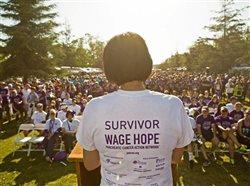
What it will take to double pancreatic cancer survival by 2020
(BPT) – For Diane Borrison, it started with her eyes. They had suddenly taken on a yellowish hue. It didn’t take her long to realize her skin had followed suit. Borrison knew right away there must be something wrong, and she scheduled an appointment with her doctor immediately.
The diagnosis was worse than she feared – pancreatic cancer.
Being told you have cancer is terrifying in any instance, but few diagnoses drive fear like pancreatic cancer. The five-year survival rate is just 7 percent. Borrison says she was shocked upon hearing the diagnosis. ‘How and why has this deadly cancer attacked me?’ she remembers asking.
‘I had always considered myself to be very healthy,’ she later wrote, recounting her experiences. ‘I’ve always been physically active. I never smoked nor had been overweight. I had recently lost a little weight, but who wouldn’t welcome that?’
Fortunately for Borrison, the same tests and scans that showed she had cancer also showed she was a candidate for the Whipple surgery; an intense operation to remove part of the pancreas. ‘My Whipple was performed at a high volume pancreatic cancer hospital,’ she says, adding that after the surgery she underwent six months of chemotherapy. During this time, she had loved ones by her side. ‘My family and friends were a source of great comfort and support.’
The surgery and chemotherapy were a success, and now, nine years later, Borrison is a member of that seven percent survival statistic. She has continued to follow-up with blood tests and scans to monitor her disease, and the results, thankfully, have been negative. ‘Right now, I am cancer free,’ she says.
Moving forward
‘Cancer free.’ These are the words every cancer patient wants to hear, and when Borrison heard them, she knew she had just been given the opportunity to do more.
As she underwent her own battle with cancer she learned more about the poor prognosis pancreatic cancer patients face, and she vowed to do everything she could to change those statistics. She started volunteering with the Pancreatic Cancer Action Network, the national organization dedicated to advancing research, supporting patients and creating hope for those affected by pancreatic cancer.
Her support has grown, and today Borrison has made improving the lives of pancreatic cancer patients her main goal. ‘We need reliable, effective treatments for this disease, not just luck.’
Finding effective treatments
Today, with the support of volunteers like Borrison, the Pancreatic Cancer Action Network is continuing the fight against this deadly disease and is aiming to double survival by 2020.
The organization was founded in 1999 and since 2003, it has awarded 123 research grants totaling more than $28 million to scientists at 51 institutions worldwide. The organization has also helped increase federal funding for pancreatic cancer research from $17 million in 1999 to more than $101 million in 2013.
Further, its Patient Central one-to-one service connects patients and their caregivers to valuable information about the disease, clinical trials, treatment options and support resources – all free of charge.
Patient Central serves more patients annually than any other single institution in the world – it has provided information, resources and hope to some 100,000 contacts since the program started in 2002.
Now the Pancreatic Cancer Action Network is aiming to raise $200 million by 2020 to significantly increase its investment in research and clinical initiatives and to redefine the future of pancreatic cancer.
One example of this is that funds raised to support the $200 million goal will allow the Pancreatic Cancer Action Network to expand the reach of its personalized medicine service, which provides eligible pancreatic cancer patients and their oncologists with information about the biology of their tumor. Information that is gathered through this service can help shape future clinical trials that drive progress for patients.
This funding goal is clearly in-line with the organization’s commitment to double pancreatic cancer survival by 2020 and improve outcomes for people like Borrison.
While there will always be fear surrounding a pancreatic cancer diagnosis, there should also be hope.
To learn more about the Pancreatic Cancer Action Network, please visit www.pancan.org.


